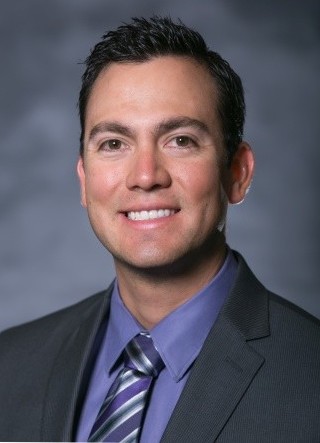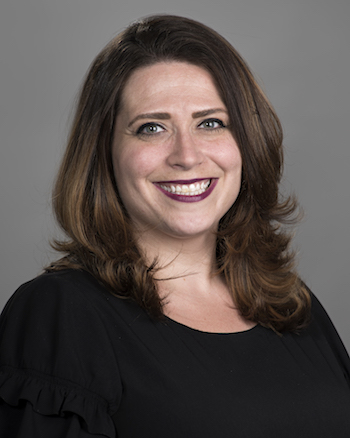Honoring STAR engineers and supporters

STAR Award recipients (from left to right) Carrie Robinson, Robert Anchondo and Erick Ponce were joined on stage by James Collofello (center), vice dean of academic and student affairs in the Ira A. Fulton Schools of Engineering and ASU student Miguel Cuen (right), a Society of Hispanic Professional Engineers National Undergraduate Representative, during the SHPE STAR Awards Gala. Photo by Erika Gronek/ASU
The 2019 Society of Hispanic Professional Engineers national convention gathered more than 9,000 STEM students, professionals and supporters together in Phoenix, Oct. 30–Nov. 3, to engage, educate and advance the careers of Hispanics in STEM.
Each year, the society gathers to honor the best and brightest among its members with the SHPE Technical Achievement Recognition, or STAR, Awards at its annual national convention.
Three of this year’s STAR Award winners have special ties to the Ira A. Fulton Schools of Engineering at Arizona State University: Two are Fulton Schools alumni, Robert Anchondo and Eric Ponce, and another is longtime engineering adviser Carrie Robinson.
The STAR Awards recognize the contributions of the society's members to science, technology and engineering fields. The 28 recipients of the 2019 STAR awards were selected from a field of nominees that include professionals, educators, students, corporations and government agencies.
Robert Anchondo
The SHPE Corporate Achievement award recognizes professionals who have made significant contributions to corporate engineering projects, departments or budgets. Individuals who receive this honor are highly visible for technical success and have earned the respect of their peers for their work. This year, Robert Anchondo was awarded as a corporate leader.
Anchondo graduated from ASU in 1991 with a bachelor’s degree in engineering. Now he is the executive director of engineering for Honeywell Aerospace’s Integrated Avionics Systems division. He manages the overall accountability and ownership of multiple platforms and customers.
He says he is the most proud of the accomplishments he can attribute to his team.

Robert Anchondo
“I have been fortunate to lead some very strong teams resulting in large spacecraft content and programs for our company that have excited and employed people for many years,” Anchondo said.
Designing a new organization in a different part of the company led Anchondo outside his defense and space background, but he found it “extremely challenging, exciting and rewarding.”
He used problem resolution, critical analytical thinking and collaborative project execution skills — skills learned at ASU — to grow his career at Honeywell Aerospace.
Anchondo had been a student member of the Society of Hispanic Professional Engineers while at ASU and reconnected with the organization as a professional. He went on to become the Honeywell Aerospace executive sponsor for SHPE engagement for two years.
“Progressive companies tend to recognize the value that a workforce rich in diverse perspectives can offer to their environment and their financial bottom line,” Anchondo said. “SHPE helps train, progress and align a broad range of high-caliber candidates to fulfill these workforce needs.”
He enjoys engaging with current society students and other professionals who have participated in the organization at ASU forums, panel discussions, technology demonstrations and career presentations.
Earning a STAR Award from the society is “quite humbling,” Anchondo said.
“In addition to the personal efforts I have made in support of STEM and diversity, it is reflective of the support that we have as a team for each other here at Honeywell,” he said. “While I am fortunate and honored to be recognized, I am there representing the countless team members who day in and day out make our workplace better for one another.”
At the Excellence in STEM luncheon, Anchondo shared experiences with other SHPE members, recognized the progress they’ve made and outlined where they can take their work in the future.
Erick Ponce
The Society of Hispanic Professional Engineers also recognizes professionals who have provided selfless and outstanding contributions to their soceity professional chapter and the Hispanic community with the Professional Role Model award. The award is given to a member in each region who exemplifies honor, community service and leadership through his or her commitment to the society.
Ponce, who was awarded the Professional Role Model award for Region 5, graduated from ASU in 2013 with a bachelor’s degree in civil engineering and in 2014 with a master’s degree in the same field. He is currently a lead civil/structural/architectural field engineer for Bechtel Mining and Metals in their global business unit. He deals with all technical aspects related to the CSA scope of work and works in conjunction with superintendents to establish the means and methods needed to execute the work.
In just five and a half years, Ponce has been given the opportunity to perform seven different assignments in five locations spanning three countries while working for Bechtel. He most recently worked on a project in Chile.

Erick Ponce
Ponce joined the society in fall 2009 during his first semester at ASU. He says it was one of the best decisions he’s made in his professional life. As a student, Ponce tried to be as active as possible.
“I am a strong believer that extracurricular activities are paramount to become a well-rounded individual,” said Ponce. “In the five years I attended ASU I was part of SHPE, MAES, ASCE, EPICS, and Bridges to Prosperity, among other organizations.”
As a member of those organizations, Ponce learned lessons that have stayed with him and helped advance his career.
“Being able to work as a team, understand how to allocate resources to meet deadlines, feel confident speaking to a crowd, etc. are characteristics that take time and effort to build up,” said Ponce. “If you are already performing them while you attend school, it will be an easy transition into the real world and will definitely give you a competitive advantage among your peers.”
While it’s been harder for Ponce to stay connected with the SHPE de ASU student chapter due to his international work assignments, he has been recently trying to connect with them for a pair of reasons.
“One is to see how Bechtel can collaborate with various student organizations such as SHPE, the Society of Women Engineers and the National Society of Black Engineers,” Ponce said. “While in Houston, we provided a combined event between those three student organizations at the University of Houston that was very successful. We want to mimic something similar at Arizona State.”
The second is provide brainstorming ideas to increase participation of ASU students at the national SHPE convention.
“As one of the largest universities in population in the United States, we should be bringing the biggest number of students every year,” Ponce said. “It is hard sometimes to show students the true value of such investment, especially when some of them are barely making ends meet.”
Being recognized by the society meant a lot to Ponce as he took the stage, following in the footsteps of those he admires.
“It is such a hard feeling to describe,” he said. “After being part of the organization for 10 years and always attending the gala, I remember seeing the people who walked that stage and thinking to myself: ‘I would love to be one of them someday’. Now here I am. After 10 years of being involved in SHPE, I will receive a national award and become a lifetime member in none other than my hometown, Phoenix, Arizona, surrounded by my family, coworkers and friends. SHPE is much more than a professional organization. It’s more like a family.”
Carrie Robinson
The society also recognizes advisers for supporting its mission and vision along with giving diligent support toward the success and development of their chapter and its members with the Advisor of the Year award. The award is presented to an official chapter adviser who demonstrates advocacy for STEM programs and aids the improvement of the five pillars of SHPE.
This year, that award went to Carrie Robinson, who has been involved with the SHPE de ASU student chapter for several years.
Robinson grew up in rural Idaho working in her parent’s automotive electrical repair business and later in the practice of a local optometrist.

Carrie Robinson
“Working through junior high and high school motivated me to seek career opportunities only available with an education beyond high school,” said Robinson. “Neither of my parents earned a college degree, but they helped me understand the value of education.”
Robinson began her college career majoring in math, and although she maintained a strong GPA, she became one of the millions of women who drop out of STEM majors. She accrued student loan debt and worked three jobs to sustain herself through school. After graduating with a Bachelor of Science in planning, public policy and management, she began a career path toward helping other underprepared students who often face similar personal, academic and financial struggles.
Early in her career, Robinson became intimately familiar with the challenges that underrepresented, ethnic minority, low income and first-generation students face. She worked to recruit diverse freshmen and transfer students, helped refine the résumés of Society of Hispanic Professional Engineers and Hispanic Business Students Association members and mentored Hispanic and undocumented students at a local high school.
Robinson joined the the Fulton Schools in 2010, where she developed and expanded undergraduate engineering success programs, including scholarships, undergraduate teaching assistants, the engineering tutoring centers, the engineering residential community, E2 (an innovative orientation for incoming first-year students) and academic success classes and workshops.
Over the last nine years, Robinson has become actively engaged with both the SHPE de ASU student chapter and the SHPE Greater Phoenix professional chapter. She regularly attends general body meetings, executive board meetings, social events and technical workshops. In that time, she’s seen firsthand how active involvement in the society has made an indelible impact on the careers of its members.
Robinson encourages her students to continue their involvement with the soceity after graduation. Alumni from SHPE de ASU have revived and joined professional chapters across the nation, joined committees on the society's national convention planning team and helped bring the national convention to Phoenix.
Along with alumni and staff who contribute to the Society of Hispanic Professional Engineers' mission, Fulton Schools faculty also play an important role in teaching and inspiring the next generation of Hispanic STEM professionals. Jean Andino, an associate professor of chemical engineering in the Fulton Schools, was named the recipient of the SHPE Educator of the Year Award in Higher Education for 2017.
More Science and technology

Time-consuming task of conserving Jane Goodall Institute field notes gets a boost from AI
Arizona State University is continuing the legacy of scientist, conservationist and ethologist Jane Goodall by bringing decades…

AI and robotics researchers at ASU work to keep people safe, healthy
As Arizona State University continues to shine in U.S. patent rankings, robotics and artificial intelligence garner a growing…

A new chapter in national security research at ASU
In 1957, the Soviet Union launched Sputnik, the world’s first artificial satellite, into a low orbit around the Earth. Only the…